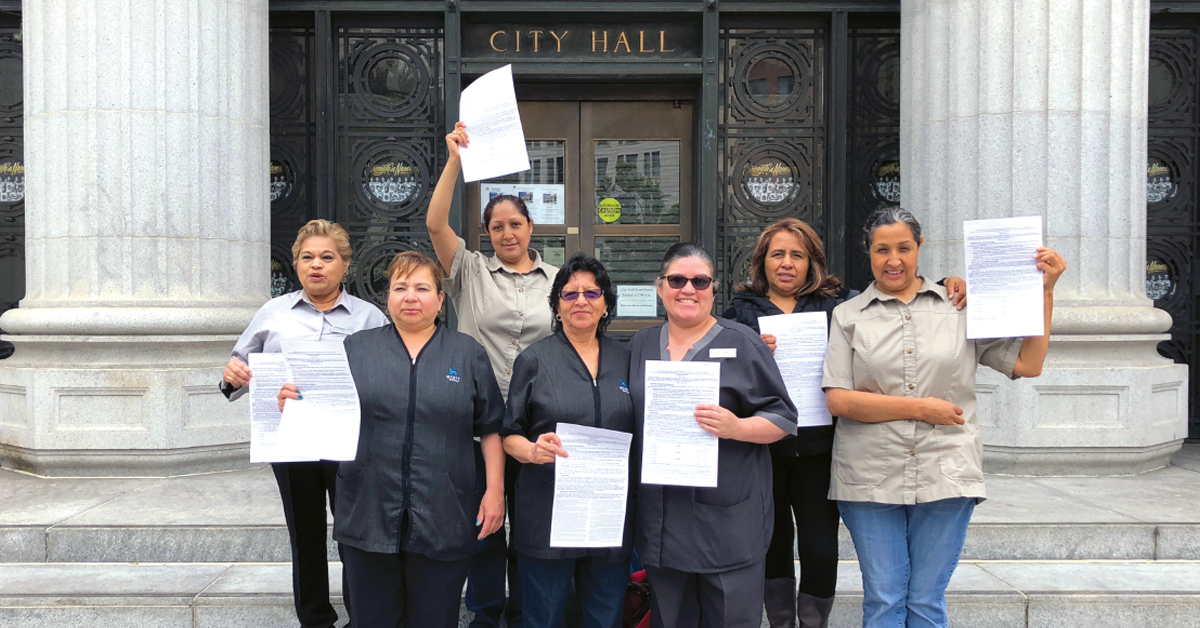It’s Elvia Perez’s firm belief that the long hours fighting to improve the rights of her fellow hotel workers will pay off sooner than later.
She participated in a campaign led by the nonprofit East Bay Alliance for a Sustainable Economy (EBASE), encouraging voters in Oakland to support Measure Z. The measure would make the city’s largest hotels pay hundreds of employees a fair wage. The action is also expected to offer some much-needed protections for the hotel workers — the majority of whom are women of color — from being harassed and sexually assaulted.
Last November, the measure passed overwhelmingly as EBASE, a longtime grantee of the San Francisco Foundation, received a grant to help fund its “Time’s Up Oakland!” Measure Z campaign.
Measure Z arrives as the #MeToo movement continues to raise awareness of sexual harassment and assault at work and the incredible toll it takes on women’s lives. Workplace sexual harassment is rampant as studies estimate between a quarter to nearly eight in 10 women experience it in some form, according to a 2018 report published by the Institute for Women’s Policy Research (IWPR).
Furthermore, women who go through workplace harassment may endure physical and mental health issues, discrimination, career interruptions, and lower earnings, the IWPR report says, justifying the need for initiatives such as Measure Z.
EBASE’s successful Measure Z campaign strategy included helping to secure more than 26,000 registered voters to sign petitions to get the measure on the ballot in Oakland. Hotel workers also helped spread the word about Measure Z by canvassing the streets with flyers and pamphlets and even sharing their personal stories on video, including their harrowing workplace conditions.
“We are often so invisible; we feel like no one cares. But, (with Measure Z) winning with 86 percent of the vote, we (now) feel seen and heard,” says Perez, 52, who has been a hotel worker for 15 years. “I felt happy being able to be in this campaign. It has made me feel so much more confident.”
Under Measure Z, hotels in Oakland with more than 50 guest rooms must now pay their workers a a minimum wage of $15 an hour (a wage increase from $13.80) with health care benefits, or $20 an hour without benefits. The hotels also must provide employees with a panic button to alert management and hotel security to protect them from harassment.
“They have told us that each room will have a button to press, so they will know which room we are in. We also will be trained on how to respond in the event of an emergency which we are all relieved about,” Perez says.
Measure Z also stipulates that larger hotels in Oakland also must abide by strict rules on how much work employees get during their shifts. For example, instead of cleaning 20 rooms during an eight-hour shift, going forward, they may be expected to clean half that number during a given shift.
“Measure Z empowers the employees. They have been constantly told, ‘Your voice doesn’t matter; You don’t have any rights, you’re here to work and go home.'” We had to change the narrative around that,” says Cynthia Morfin, an EBASE staffer who works with Oakland-based organizations. “They were also doing extraneous labor during their shifts, and that’s just plain wrong.”
Similar initiatives in Chicago, Seattle, Long Beach, California, and Miami, inspire the “Time’s Up Oakland!” movement, Morfin says. Time’s Up is a social welfare organization that works to address systemic inequity in the workplace for women.
Perez says working on the campaign allowed her to open up, “not only at work but in all areas of my life.” She’s also anxious to see what happens when Measure Z is fully implemented. The measure took effect in Oakland on July 1, 2019.
“We know that even at those wages, it is still hard to support a family and live in Oakland and the Bay Area,” Perez says. “But this measure is a step towards bringing justice to workers –specifically for working women of color.”
By Terry Collins, foundation consultant


